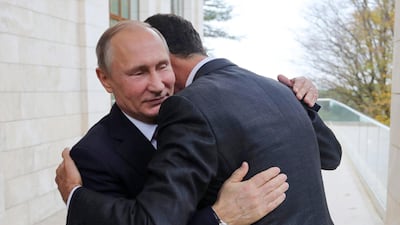Russian President Vladimir Putin may be facing a crisis of public confidence in his military policies in Syria as new polling data show that fewer Russians than ever support his intervention in the eight-year war.
The figures, released on Monday by one of Russia’s only independent polling groups, show that more than half of the population believe the Kremlin should end its military campaign in Syria.
Russia entered the war in September 2015 on the side of Syria’s embattled leader, Bashar Al Assad. Regime forces and their allies were losing ground to militants and armed opposition groups until the Kremlin rallied to Mr Al Assad’s side and turned the tide of the conflict in his favour.
The Kremlin sought to minimise the public impact of its intervention back home by sending relatively few ground troops, opting instead for an air campaign and hiring private military contractors whose losses might be overlooked in the domestic news cycle.
Officials in Moscow were reticent to give official tallies of military losses and, last week, the Defence Ministry denied reports that four of its servicemen were killed in the northern Syrian province of Hama. Estimates by politicians in Moscow and Russian media reports suggest losses may be between 125 and 170.
However, nearly three years since Russian warplanes began pounding opposition forces, public discontent over the Kremlin’s intervention is mounting. The figures published on Monday by the Levada Centre show that 55 per cent of the Russian public believe the Kremlin should end its campaign in Syria, up 6 per cent from August 2017.
The results of the Levada poll also indicate that Russians are losing interest in the conflict, with more than one third of respondents saying they don’t know anything about recent developments in the conflict. That figure, 39 per cent, doubled since last year.
Gumer Isaev, who heads the St Petersburg Centre for the Contemporary Middle East Studies, told the RBC business news portal that Russians tend to view Moscow’s conflicts in the Middle East negatively because of the historical memory of Russia’s costly wars in Afghanistan and Chechnya.
Mr Isaev attributed Russians’ lack of interest to the fact that the conflict was claiming fewer headlines and column inches in the domestic press. “Compared to last year, when there were active hostilities, the situation there now is more or less calm,” he said.
Russian political analyst Alexei Makarkin told RBC that the poll results reflected Russians’ preoccupation with economic difficulties at home that are forcing many to tighten their belts. “People have become irritated by [the Kremlin’s] foreign policy agenda,” he said.
The news of the public’s fatigue may be coming at an inopportune time for the Russian authorities. Renewed Syrian and Russian bombardments in the north-west province of Idlib suggest that forces allied to Mr Al Assad may be gearing up for a final showdown in the last bastion of opposition-held territory.
Syrian government media reported on Monday that the army had expanded its response to “violations by rebels” and said that a full ground assault may be imminent.
Russia and Turkey brokered a deal with the Syrian regime last September to postpone a major offensive on Idlib, which is home to around three million people. Turkey is concerned that a large-scale military operation will force a massive wave of refugees across its border.
Russian military officials and the Syrian regime, however, are impatient to win back the territory which is controlled by a militant group affiliated with Al Qaeda known as Hayat Tahrir Al Sham.
Another stark reminder of Russia’s entrenched military role came on Monday when officials in the Defence Ministry said that Syrian militants fired rockets at Russia’s Hmeimim airbase near the city of Latakia, which is located on the Mediterranean.
The ministry said the incident had not resulted in any casualties or damage to the airbase. However, the attack and the Kremlin’s role in the impending assault on Idlib threaten to sway public sentiment even more about Russia’s place in the conflict.

